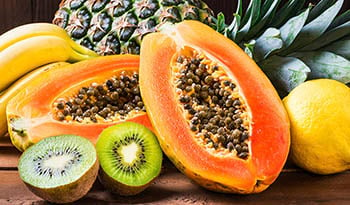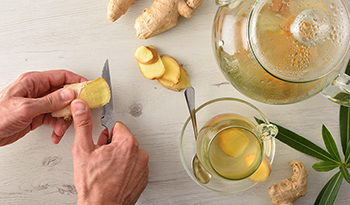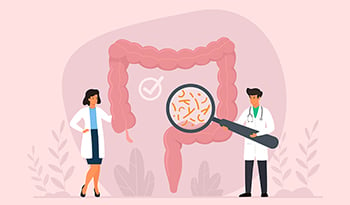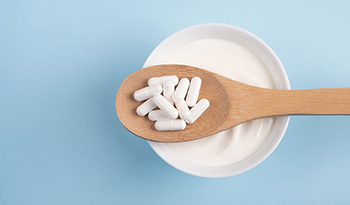Науката за подреждане на корема

Терминът „подут“ обикновено се хвърля в случайни разговори между приятели и колеги, но какво всъщност означава да си подут? Какво причинява подуване на корема, какво се случва в тялото ви, когато се чувствате по този начин и кога подуването на корема е причина за безпокойство или допълнителна медицинска помощ?
Много неща могат да причинят подуване на корема и дискомфорт в корема, включително просто ядене и смилане на храна. Въпреки че подуването на корема е често срещано явление, разбирането на причините за него и вашите индивидуални тригери може да помогне за намаляване или избягване на симптомите на подуване на корема.
Като регистриран диетолог обичам да помагам на хората да се чувстват най-добре преди, по време и след хранене. Така че, нека се задълбочим в науката зад подуването на корема.
Какво е подуване на корема?
Подуването на корема е усещане за пълнота или раздуване на корема, често причинено от натрупване на газ или течност в червата. Това е едно от най-честите храносмилателни оплаквания.1
Подуването на корема може да бъде неудобно или дори болезнено и може да бъде придружено от прекомерни газове, подригване или бучене. Някои сравняват усещането с балон, който се надува в корема. Освен физическия дискомфорт, подуването на корема може да доведе до по-стегнати дрехи и по-закръглен, по-изпъкнат корем.
Причини за подуване на корема
Различни фактори могат да доведат до подуване на корема, така че може да бъде трудно да се определи точната причина. Най-честата причина за подуване на корема е газът в храносмилателната система , обикновено скоро след хранене. Излишният газ може да бъде причинен от храните, които ядете, или дори от начина, по който ги ядете.
Бактериите в червата ви усвояват фибрите в храните, които ядете, създавайки газ като страничен продукт от храносмилането им. Докато богата на фибри диета предлага много ползи за здравето, някои храни с високо съдържание на фибри, известни като FODMAPS, като лук, бобови растения, карфиол, ябълки и пшенични трици, могат да доведат до натрупване на неудобни газове в храносмилателния тракт при някои индивиди.2,3
Други причини за подуване на корема включват:
- Запек
- Преяждане
- Чувствителност на червата
- Гинекологични и хормонални състояния (промени в менструалния цикъл, перименопауза)
- Гастропареза (състояние, при което стомашните мускули не работят правилно)
- Хранене твърде бързо
- Хранителна непоносимост или алергии
- Стрес
- Депресия или тревожност
- Скорошна промяна на теглото (загуба или наддаване)
- Скорошно заболяване (остро или хронично)
- Недостатъчен прием на течности с повишен прием на фибри
- Висок прием на фибри
- Твърде малък прием на фибри
- Заседнал начин на живот
Естествени начини за предотвратяване на подуване на корема
Добрата новина? Можете да предотвратите подуването на корема естествено , като направите прости промени в начина на живот и разберете нуждите на тялото си.
Ако постоянно се чувствате подути след хранене, започнете с водене на дневник за храна, за да идентифицирате и избегнете задействащите храни. Проследявайте как се чувствате след ядене на всяко хранене. Може да започнете да виждате модели от видове хранене, храни, време на хранене и съставки. За да бъдете изключително задълбочени, обърнете внимание и на потенциалните хормонални влияния и стресови фактори. С тази информация можете да опитате елиминираща диета под ръководството на регистриран диетолог, за да намалите симптомите.
Други естествени начини за предотвратяване на подуване на корема включват:
- Избягвайте да ядете задействащи храни
- Избягвайте преяждането
- Практикувайте внимателно хранене
- Яжте по редовен график
- Избягвайте да ядете твърде бързо
- Избягвайте богати и мазни/преработени храни
- Избягвайте пържени храни
- Пийте много течности
- Избягвайте храни и дейности, които биха могли да внесат въздух или газ в стомаха ви, като дъвка, пиене от сламка или пенливи или газирани напитки
- Яжте много фибри, добавяйки ги бавно в диетата си, като същевременно осигурявате адекватен прием на течности
- Избягвайте изкуствени подсладители и захарни алкохоли
- Избягвайте консумацията на алкохол
- Упражнявайте ежедневно
- Разходете се след хранене
- Минимизирайте стресовите фактори в живота си, когато е възможно, и ефективно управлявайте стреса
- Намаляване на времето на екрана
- Получете адекватен сън
- Вземете кръвна проба, за да идентифицирате всички дефицити на хранителни вещества и да допълвате правилно
За да предотвратите подуването на корема, ще трябва да разкриете основната причина или причините, които предизвикват реакцията в тялото ви. Работата с регистриран диетолог или доверен медицински специалист може да помогне.
Естествени начини за облекчаване на подуването на корема
Да бъдеш подут е неудобно. Въпреки че няма магическо универсално решение, за да се отървете от подуването на корема, когато се случи, има някои неща, които можете да направите, за да облекчите подуването по естествен път .
Подуването на корема е отчасти тялото ви, което смила храната и понякога просто трябва да дадете време на тялото си. Храносмилателната система на всеки реагира различно.
Ето няколко неща, които можете да опитате, за да получите облекчение от подуване на корема:
- Билкови чайове като лайка, мента, копъри джинджифил смеси
- Костен бульон
- Магнезий (въпреки че твърде много магнезий всъщност може да доведе до подуване на корема и диария)
- Елиминиращи диети
- Масло от мента
- Специални диети като FODMAP диетата
- Антиациди
- Пробиотици
- Упражнение
- Пийте достатъчно вода
- Вписване, медитация, разтягане
- Използване на бутилка с гореща вода или нагревателна подложка
Отново, за дългосрочно облекчаване на подуването на корема, намерете основната причина за симптомите и прилагайте промените последователно. Съобразяването с промените в диетата и начина на живот ще гарантира, че резултатите, които постигате, са дългосрочни.
Кога да посетите лекар
Докато подуването на корема е често срещано притеснение и обикновено не е причина за тревога, потърсете медицинска помощ, ако възникнат следните ситуации:
- Подуването на корема се влошава
- Вашето подуване продължава повече от седмица
- Подуването на корема е придружено от постоянна болка
- Появяват се допълнителни симптоми, като гадене, повръщане и кървене
- Забелязвате промени в движенията на червата
Вие познавате тялото си най-добре — ако се чувствате отвратени или промените са нови и/или необясними, потърсете подкрепа от доверен медицински специалист.
Вкъщи за вкъщи
Само защото подуването на корема е често срещано, не означава, че трябва да го приемете и да го издържите. Водете дневник за храна, за да идентифицирате потенциалните тригери на подуването на корема. Не забравяйте, че подуването на корема не се причинява само от това, което ядете, но може да бъде повлияно и от начина, по който ядете. Опитайте се да прилагате бавно препоръките за начин на живот и използвайте естествени газове и добавки за намаляване на подуването , когато е посочено.
Консултирайте се с доверен доставчик на здравни услуги, преди да започнете нова добавка, за да сте сигурни, че е безопасна за вас. И потърсете медицинска помощ, ако симптомите се влошат или не намерите облекчение само от промените в начина на живот.
Препратки:
- Мошири Б, Дросман Д, Шаукат А. Актуализация на клиничната практика на AGA за оценка и управление на оригване, подуване на корема и раздуване: експертен преглед. Гастроентерология. 2023; 165 (3): 791-800.e3.
- Песарели Т, Сорге А, Ели Л, Костантино А. Диетата с ниско съдържание на FODMAP и диетата без глутен при управлението на функционалното подуване на корема и раздуване. Преден номер 2022; 9:1007716.
- Барбър ТМ, Кабиш С, Пфайфер АФХ, Вайкерт МО. Ползите за здравето от диетичните фибри. Хранителни вещества. 2020; 12 (10): 3209.
ОТКАЗ ОТ ОТГОВОРНОСТ:Този УЕЛНЕС ХЪБ няма за цел да поставя диагнози...

















































































 Съдържание
Съдържание















